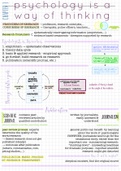PRODUCERS OF RESEARCH → professors, research scientists,... r
shared commitment to
CONSUMERS OF RESEARCH → therapists, police officers, teachers,... empiricism & curiosity about
psychology
systematically interrogating information (empiricism,...)
Research Consumers =
evidence based treatments - therapies supported by research
-
1. empiricism → systematic observations BASIC RESEARCH
2. theory-data cycle expanding the
general body of
knowledge
3. basic & applied research - empirical approach
4. go further, build research on research TRANSLATIONAL RE
5. publication (scientific journal, etc.) development Retesting
SEARCH treatments
applications
of
using
of
etc .
basic research
to
lessons
tr
APPLIED RESEARCH
practical real -
world problem
THEORY in mind
+
RESEARCH
QUESTIONS SUPPORTING DATA THROUGH
RESEARCH STUDIES
tr
A Good Theory evaluation of theory is based
SUPPORTING RESEARCH NONSUPPORT
DATA DESIGN ING DATA
FALSIFIABILITY PARSIMONY on the weight of the evidence
"
is not used in science
"
PROVE
HYPOTHESES
to
DATA
contains peer- written by journalists,
reviewed articles by easily accessed &
qualified contributors understood
primary audience: scientists, psychology students audience: general public
peer-review process: experts general public can benefit by learning
determine the quality of the about the work of psychologists
work/research HOWEVER: journalists tend to go for the
→ flawed research does not get sensational story, rather than the
published (ideally) important one - summarising research:
→ continues after publication “dumbing down” - misleading headlines
(letters, commentaries, com‐ for dramatic purposes - reported scientific
peting studies,...) research might get distorted
PUBLICATION MAKES PROCESS
OF RESEARCH TRANSPARENT skeptical mindset, find the original source
, inside view is not as
accurate and valuable
as outside view
variables are
hard to
isolate in the
real-world
(too many al-
ternative ex-
:
planations &
no control)
the most accurate
conclusion requires
all data (systematic
comparison)
collection of chapters/research on a common topic, each chapter is written by a different
author, summarises a collection of research and explains the theory behind it Finding Scientific Sources:
summary of all published studies of one research area 1. Library reference staff
method, statistical meta-analysis: quantitative technique which combines the
tests & results of a
2. PsycINFO
results of multiple studies to give the effect size of a
study relationship
3. Google Scholar
COMPONENTS OF AN EMPIRICAL ARTICLE
- behavioral research is probalistic - conclusions are expected to
ABSTRACT PSYCINFO
only explain a proportion of the population, there are always cases
the finding do not apply to (conclusions are based on patterns summary (hypotheses, method, major results) maintained & updated weekly, shows all
through a setting including many test objects & comparison articles written by a single author or under a
groups) INTRODUCTION single keyword, says whether a source was peer
- scientific reasoners collect potentially disconfirming evidence reviewed, shows what articles cited target
§1 topic
(theory-data-cycle)
§2 background of research article
§3 research questions, goals, hypotheses a subscription by the university is necessary to
→ accepting a conclusion because it seems natural (good stories are access PsycINFO
more believable) METHOD
→ availability heuristic: things that come easy to mind, anything
that require rather complex thinking is disregarded
participants, materials, procedure, apparatus, ... GOOGLE SCHOLAR
→ present/present bias: 'absent' cells are not taken into account, contains articles from all scholarly disciplines,
appropriate comparison groups are not considered RESULTS free to access, search can not be limited, articles
→ confirmation bias: only looking at information that supports one's
quantitative & qualitative results, statistical tests are not categorised, user profiles of scientists
believes & disregarding any potentially contradicting evidence
→ bias blind spot: being unaware of one's own biases, believing they show you their published work
don't apply to oneself DISCUSSION
summarises research questions & methods - how well do the
results support hypotheses; study‘s importance, alternative
confederate - an actor playing a specific role in an experiment
explanations, further questions
REFERENCES
full bibliographic listing of all sources





